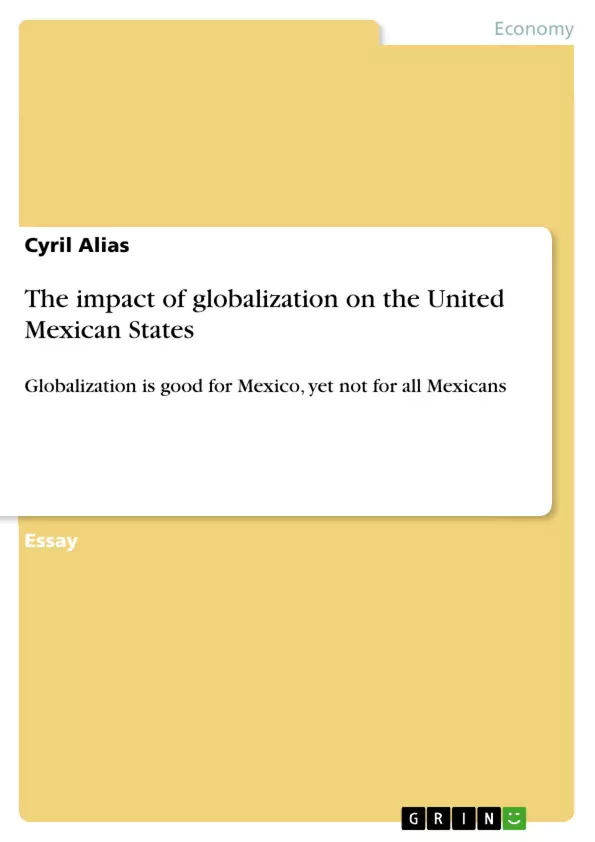Mexico has gained increasing significance in both regional and international business, due to the phenomenon generally known as globalization or mundialización, as Mexicans prefer to name. Globalization is explained as an increase of international economic and socio-cultural relations, especially in terms of supra-regional trade , , driven particularly by technology and media.
In 1982, Latin America has started executing a wide opening of its markets and a “quick liberalization of the latter” , as a reaction to “a severe balance of payments crisis” . Over the years, its geo-strategic position between North and South America as well as the globalization “have made Mexico the darling of the international business community” , at least one of the many beneficiaries in Latin America, Asia and Eastern Europe. Most recently, “The Economist” certified Mexico’s economy to be “in good shape” with “no serious macroeconomic problems at the horizon.” ,
So, generally and superficially speaking, Mexico is seemingly looking at a bright future in economic terms.
Having this said, one has also to consider that integration and globalization are based on quickly developed and implemented trade developments, slowly followed by socio-political and cultural effects.
Yet, the economic rise following the measures mentioned above has had several drawbacks, such as “three currency crises, […] the most recent of which occurred in 1995 following a large devaluation of the peso”.
Effects of the integration development of the previous two decades were presented as mainly positive in the public, especially by lobbyists and groups favouring the current trends. However, there has been a large group of losers, which has not participated in the economic upswing of the country yet and probably will not for quite a long period of time. As a proof, one can consult different statistics about poverty increase in the country. ,
So, finally I want to analyse and, by weighing pro and contra arguments, possibly prove the thesis that there have been many advantages created and put into action by globalization, but that many Mexicans have not yet been included into the advantages of it yet.
In order to carry this out, I am going to look closer at different forces of globalization acting upon Mexico as well as the different stakeholder groups representing the various interests involved nowadays in the overall development of the country.
Table of Contents
- Globalization is good for Mexico, yet not for all Mexicans
- Globalization is good for Mexico, yet not for all Mexicans
- Globalization is good for Mexico, yet not for all Mexicans
- Globalization is good for Mexico, yet not for all Mexicans
Objectives and Key Themes
This essay examines the impact of globalization on Mexico, focusing on the economic, social, and cultural changes that have occurred as a result of increased international integration. It explores the benefits and drawbacks of globalization, considering both its positive effects on the national economy and its negative implications for certain segments of the Mexican population.
- The economic impact of globalization on Mexico
- The role of trade agreements like NAFTA in shaping Mexico's economic landscape
- The influence of globalization on Mexican culture and society
- The challenges of poverty and inequality in the context of globalization
- The potential for globalization to contribute to sustainable development in Mexico
Chapter Summaries
The first chapter provides an overview of globalization's impact on Mexico, highlighting the country's growing significance in international business. It discusses the economic opening of Mexico's market in the 1980s and the positive economic outlook for the country. The chapter also notes that while Mexico appears to be benefiting from globalization, the benefits have not been evenly distributed.
The second chapter delves into the structural adjustments that Mexico has undertaken as a result of globalization. It examines the country's trade relationships, particularly with the United States, and the impact of trade agreements such as NAFTA. The chapter also explores the influence of globalization on Mexican culture and society.
Keywords
The main keywords and focus topics of this essay are globalization, Mexico, economic development, trade agreements, NAFTA, cultural change, poverty, inequality, and sustainable development. It examines the impact of these factors on the Mexican economy, society, and culture.
Frequently Asked Questions
What is the main impact of globalization on Mexico?
Globalization has significantly increased international economic and socio-cultural relations in Mexico, making it a key player in international business. However, while the national economy has seen growth, the benefits have not reached all segments of the population equally.
What role did NAFTA play in Mexico's development?
NAFTA (North American Free Trade Agreement) was a crucial trade agreement that shaped Mexico's economic landscape by integrating its markets more closely with the United States and Canada.
When did Mexico start opening its markets?
Mexico began a wide opening of its markets and quick liberalization in 1982, largely as a reaction to a severe balance of payments crisis.
What are the negative effects of globalization mentioned?
Negative effects include currency crises (such as the 1995 peso devaluation), increased poverty for certain groups, and rising inequality despite macroeconomic stability.
How does globalization influence Mexican culture?
Globalization, driven by technology and media, has led to significant cultural changes and shifts in social relations due to increased international integration.
- Arbeit zitieren
- Dipl.-Kfm. B.B.A. Cyril Alias (Autor:in), 2005, The impact of globalization on the United Mexican States, München, GRIN Verlag, https://www.grin.com/document/89967



